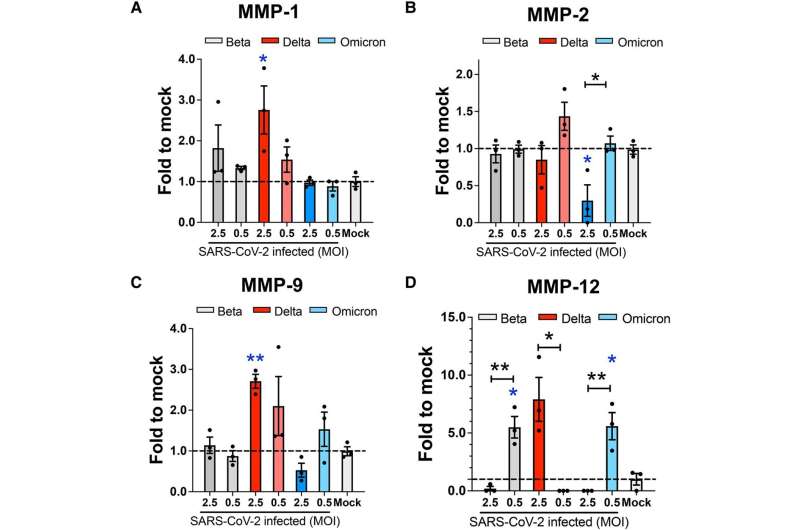This article has been reviewed according to Science X's editorial process and policies. Editors have highlighted the following attributes while ensuring the content's credibility:
fact-checked
peer-reviewed publication
trusted source
proofread
Studies examine different responses to SARS-CoV-2 variants

Two studies led by a researcher at UT Southwestern Medical Center show the effects of different SARS-CoV-2 variants on lung tissue, revealing what may cause some COVID-19 infections to be more severe than others. Both studies, published in The Journal of Infectious Diseases, provide new perspectives that could advance treatments for COVID-19, which has been linked to millions of deaths worldwide since January 2020.
In the first study, researchers investigated how specific SARS-CoV-2 variants affect lung tissue remodeling, which occurs as part of the body's response to viral infections.
"This study is among the first to demonstrate that unique SARS-CoV-2 variants of concern induce differential effects on mediators of lung tissue remodeling that may explain their varied abilities to cause severe COVID-19," said lead author Theodoros Kelesidis, M.D., Ph.D., Associate Professor of Internal Medicine and Immunology and a member of the Division of Infectious Diseases and Geographic Medicine at UT Southwestern. Dr. Kelesidis joined UTSW in 2023 from the David Geffen School of Medicine at UCLA, where the research originated.
The study focused on mediators of airway tissue remodeling, specifically matrix metalloproteinases (MMPs), which are essential enzymes in tissue reshaping. Employing a human airway cell culture model and a mouse model of SARS-CoV-2 infection, the researchers discovered consistent increases in certain MMPs across different variants.
These observed changes in MMPs might explain why some SARS-CoV-2 variants lead to more severe cases of infection.
"Excess tissue metalloproteinase activity following viral infections may be linked to host morbidity or mortality and increased lung damage," Dr. Kelesidis explained.
The researchers suggest that targeting these MMPs holds promise for future treatments, potentially reducing lung injury, hospitalizations, and long-term complications in COVID-19.
Complementing this work, the second study examined how SARS-CoV-2 variants, including the delta and omicron strains, exhibit distinct behaviors at the viral protein level within specific lung cell subtypes.
"This research builds on prior findings from the lab that viruses such as SARS-CoV-2 and HIV induce unique molecular signatures of tissue damage in humans that contribute toward end-organ disease," Dr. Kelesidis said.
Using a mouse model, the researchers explored the different patterns of viral protein levels among ciliated airway cells, alveolar type 1 (AT1) and AT2 cells, immune cells, and endothelial lung cells.
"Our studies provide novel insight into the pathogenesis of tissue damage in SARS-CoV-2 infection," Dr. Kelesidis noted. "These data are consistent with a conceptual model in which increases in viral proteins in unique lung cell subtypes, including immune cells, is happening in vivo during SARS-CoV-2 infection."
The findings also suggest a link between differences in SARS-CoV-2 viral protein levels and the severity of lung disease, laying the foundation for understanding why certain variants, such as delta, correlate with more severe infection.
Looking ahead, the researchers advocate for additional studies on the expression of viral proteins in unique SARS-CoV-2 variants among airway cells.
More information: Michael Wong et al, Severe Acute Respiratory Syndrome Coronavirus 2 Infection Alters Mediators of Lung Tissue Remodeling In Vitro and In Vivo, The Journal of Infectious Diseases (2023). DOI: 10.1093/infdis/jiad536
Leila Fotooh Abadi et al, Single-Cell Profiling of the Differential In Vivo Impact of Severe Acute Respiratory Syndrome Coronavirus 2 Infection Among Lung Tissue Cell Subtypes at the Protein Level, The Journal of Infectious Diseases (2024). DOI: 10.1093/infdis/jiad567


















